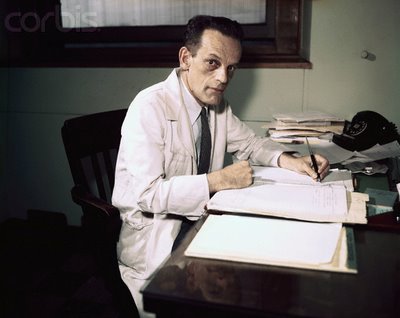<Back to Index>
- Microbiologist Max Theiler, 1899
- Illustrator Georg Dionysius Ehret, 1708
- Roman Emperor Marcus Didius Severus Julianus, 133

Max Theiler (January 30, 1899 – August 11, 1972) was a South African/American virologist. He was awarded the Nobel Prize in Physiology or Medicine in 1951 for developing a vaccine against yellow fever.
Theiler was born in Pretoria, South Africa, his father Arnold Theiler was a veterinary bacteriologist from Switzerland. He attended Pretoria Boys High School, Rhodes University College, and then University of Cape Town Medical School graduating in 1918. He left South Africa to study at St Thomas's Hospital Medical School, King's College London, and at the London School of Hygiene and Tropical Medicine. In 1922 he was awarded a diploma in tropical medicine and hygiene and became a licentiate of the Royal College of Physicians of London and a member of the Royal College of Surgeons of England. Theiler wanted to pursue a career in research, so in 1922 he took a position at the Harvard University School of Tropical Medicine. He spent several years investigating amoebic dysentery and trying to develop a vaccine for rat-bite fever. He became assistant to Andrew Sellards and started working on yellow fever. In 1926 they disproved Hideyo Noguchi that yellow fever was caused by the bacterium Leptospira icteroides, and in 1928 the year after the disease was identified conclusively as a virus, they showed that the African and South American viruses are immunologically identical, after Adrian Stokes induced yellow fever in Rhesus monkeys from India. In the course of this research Theiler himself contracted yellow fever but survived and developed immunity.
In 1930 Theiler moved to the Rockefeller Foundation in New York, where he later became director of the Virus Laboratory and where he spent the rest of his career. After
passing the yellow fever virus through laboratory mice, Theiler found
that the weakened virus conferred immunity on Rhesus monkeys. The stage
was thus set for Theiler to develop a vaccine against the disease.
However, it was only in 1937, after the particularly virulent Asibi
strain from West Africa had
gone through more than a hundred subcultures, that Theiler and his
colleague Hugh Smith announced the development of the 17-D vaccine.
Between 1940 and 1947 the Rockefeller Foundation produced more than 28
million doses of the vaccine and finally ended yellow fever as a major
disease. For this work Theiler received the 1951 Nobel Prize in Physiology or Medicine. Theiler was awarded the Royal Society of Tropical Medicine and Hygiene's Chalmers Medal in 1939, Harvard University's Flattery Medal in 1945, and the American Public Health Association's Lasker Award in 1949.